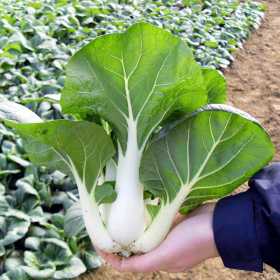Thanks to John Harrison of Allotment & Gardens
Pak Choi is a quick, easy crop to grow . It is also called Chinese Cabbage (or Chinese Leaves) and is part of the wider brassica family, but looks more like some of the lettuces. The crisp leaves are slightly mustardy in taste.

Recommended Varieties of Pak Choi Chinese Cabbage
- Pak Choi is available in a range of colours, from white through green, to red or purple
- It is often thought that the green varieties taste better than the white ones
Pests and Problems
- Liable to attack by all of the brassica pests and diseases (e.g. cabbage root fly, flea beetle, cabbage white butterflies / caterpillars, club root), but as they are fast-growing they generally escape most of them
Sowing & Growing Pak Choi Chinese Cabbage
See here for general info on growing brassicas.
- Pak Choi like full sun but will tolerate partial shade
- Sow March-July according to the particular variety, directly into moist soil with lots of organic matter, 1 cm deep in rows spaced 45 cm apart
- They can be grown as cut-and-come again plants, baby leaves, or fully mature plants
- If growing as baby leaves, thin to 10 cm between plants
- Thin mature plants to 20-30 cm spacing
- Harvest in April – October, according to variety.
- Cut mature plants off at the stump; a flush of new leaves may appear
Harvesting, Eating & Storing Pak Choi Chinese Cabbage
- Usually ready to harvest 30 days after sowing (baby leaves) or 60 days (mature plants)
- Valued as a source of folic acid, and vitamins A & C
- Can be eaten raw (e.g. salads), or cooked (e.g. stir fried, or steamed as a whole vegetable as a side dish)
- Will store in the fridge for about a week
Additional Information
- Suitable for growing in containers


